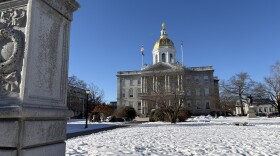Lawmakers took more testimony Tuesday for and against a bill to legalize recreational marijuana.
Those who support legalizing marijuana say the time has come. Opponents argued the bill is an effort by advocates to get a toehold for the marijuana industry in New Hampshire.
Dr. William Goodman, Medical Director at Catholic Medical Center, opposed the bill on behalf of the New Hampshire Medical Society.
“This is getting on a very steep, slippery slope with your first welcoming an uncalculated amount, an untold huge amount of expenses without any revenue,” he said. “The next step will be looking for revenue.”
The full House passed the bill last month. It would permit up to three-quarters of an ounce of pot and six plants.
As amended, it does not currently propose a tax, but it was referred to the House Ways and Means Committee for review, and the public hearing. The committee is tasked with considering bills relating to revenue raised by a tax.
Rep. Norm Major, a Plaistow Republican who is committee chair, said he shared the frustration expressed by some audience members as he tried to limit testimony to the scope of the current bill.
As introduced, the legislation had proposed a tax on commercial marijuana enterprises, with fiscal analysis indicating tax revenue would raise between $42 million and $52 million annually - numbers based on estimates out of Colorado, which has legalized marijuana.
The bill as amended by the House removed the tax implications. It proposes a couple of fines, including a $100 fine for adults caught using marijuana in public.
Matt Simon, New England Political Director for Marijuana Policy Project, said Tuesday he advised some supporters of the bill that the hearing was not a forum to advocate for marijuana because it was a revenue committee. Several supporters testified in favor, though.
Simon said the committee should simply leave the bill be.
“It shouldn’t be a hearing on whether or not marijuana should be illegal or not,” he told NHPR before the hearing. “That’s already been determined by the House.”
Major said something similar during the hearing.
Bedford Police Chief John J. Bryfonski says it’s a matter of lost revenue, particularly for towns and cities. Speaking against the bill on behalf of the New Hampshire Association of Chiefs of Police, he said the bill would be a costly burden for police departments across the state.
“You’re going to undoubtedly hear, or have heard testimony from others, that guarantees or asserts that revenue from taxation or other revenue streams will cover the cost of any such program here in New Hampshire or even make money,” said Bryfonski. “In fact, you’ve probably heard that tax revenue from regulated marijuana sales will solve all our fiscal woes as well as cure a host of maladies. These assertions are without foundation and a factual basis to support such claims.”
Supporters maintained that marijuana can be safely regulated - that the bill is not that different from a law recently signed in Vermont. Advocates in the Legislature have pointed out that New Hampshire will become surrounded by states that permit recreational marijuana use for adults in some fashion.
Goodman, the CMC Medical Director, referenced this argument in his testimony Tuesday. “Legalizing marijuana for recreational use would be like legalizing moonshine for consumption. It’s not ready to be released to our neighbors, friends, and families,” he said.
He then referenced the “New Hampshire Advantage,” which he says is a product of Granite Staters thinking for themselves. New Hampshire’s neighbors have legalized marijuana. It’s also true, Goodman said, that these same neighbors have an income tax and sales tax.
A separate legislative commission is studying the potential impacts of marijuana legalization, regulation, and taxation, and will issue a report by November.
Gov. Chris Sununu is opposed to legalization.








